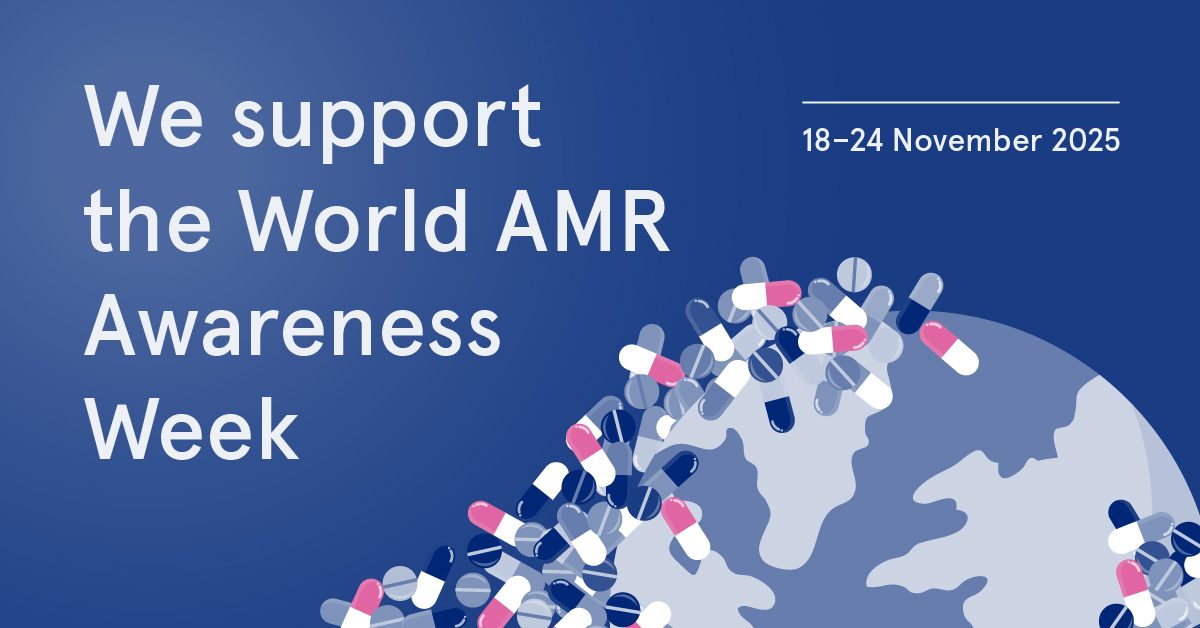World AMR Awareness Week (WAAW) is observed 18-24 November
World AMR Awareness Week (WAAW) is here with a theme: “Act Now: Protect Our Present, Secure Our Future.” WAAW is a global campaign observed annually to raise awareness and understanding about antimicrobial resistance and encourage best practices among the public and policy makers.
Aidian takes part in supporting antimicrobial stewardship and sustainable use of antibiotics in primary care.

Antimicrobial resistance – the Silent Pandemic
Antimicrobial resistance (AMR) means the ability of micro-organisms, including bacteria, viruses, fungi, and parasites, to resist treatment. In most cases, AMR specifically concerns antibiotic resistance, which occurs when bacteria develop the ability to withstand the effects of antibiotics.
AMR, also known as the Silent Pandemic, is one of the top global public health and development threats. It has been ranked among the top three priority health threats by the European Commission and Member States and the World Health Organization (WHO) has listed AMR among the top 10 global health threats facing humanity.1,2
Latest WHO findings on antibiotic resistance
WHO recently published Global antibiotic resistance surveillance report 2025 presenting a global comprehensive analysis of antibiotic resistance prevalence and trends. According to the report, resistance to life-saving medicines is critically high and rising.3
The report states that in 2023, approximately one in six laboratory-confirmed bacterial infections worldwide were caused by bacteria resistant to antibiotics.3 WHO warns of widespread resistance to common antibiotics worldwide - especially drug-resistant Gram-negative bacteria are becoming more dangerous worldwide.4
The role of point-of-care testing in primary care
In healthcare, optimising antibiotic use is key in combating AMR: decreasing antibiotic overuse and providing antibiotics to those patients who benefit from the treatment.
Fast, accurate, and easy-to-use point-of-care (POC) diagnostic tests play an important role in optimizing antibiotic prescribing for respiratory tract infections in primary care. Respiratory tract infections are the most common reason for antibiotic prescribing in primary care, even though the majority of infections have viral cause or are self-limiting.5
CRP testing: a key tool against antibiotic overuse
C-reactive protein (CRP) point-of-care testing (POCT) is considered as a key player in healthcare to guide rational use of antibiotics and prevent the development of antibiotic resistance. CRP POCT has several benefits in management of patients with respiratory tract infections in primary care:
- provides immediate results for faster decisions
- increases diagnostic certainty for physicians
- targets antibiotic use for those patients who truly benefit from the treatment
- reduces antibiotic use by approximately 23% in acute respiratory tract infections6
Learn more about antimicrobial resistance and our QuikRead go CRP test portfolio.
The choices we make today in managing infections have a profound impact on global health in the future. Advancing smarter, evidence-based antibiotic use is essential for a healthier tomorrow.
References:
- European Commission. EU Action on Antimicrobial Resistance. Available at (accessed 10.11.2025): https://health.ec.europa.eu/antimicrobial-resistance/eu-action-antimicrobial-resistance_en
- World Health Organization (WHO). Ten threats to global health in 2019. Available at (accessed 10.11.2025): https://www.who.int/news-room/spotlight/ten-threats-to-global-health-in-2019
- World Health Organization (WHO). Global antibiotic resistance surveillance report 2025. Available at (accessed 10.11.2025): https://www.who.int/publications/i/item/9789240116337
- World Health Organization (WHO). WHO warns of widespread resistance to common antibiotics worldwide. Available at (accessed 11.11.2025): https://www.who.int/news/item/13-10-2025-who-warns-of-widespread-resistance-to-common-antibiotics-worldwide
- Bjerrum L et al. Health Alliance for Prudent Prescribing, Yield and Use of Antimicrobial Drugs in the Treatment of Respiratory Tract Infections (HAPPY AUDIT). BMC Fam Pract 2010; 11:29.
- Smedemark et al. Biomarkers as point-of-care tests to guide prescription of antibiotics in people with acute respiratory infections in primary care. Cochrane Database of Systematic Reviews 2022; 10: CD010130.


